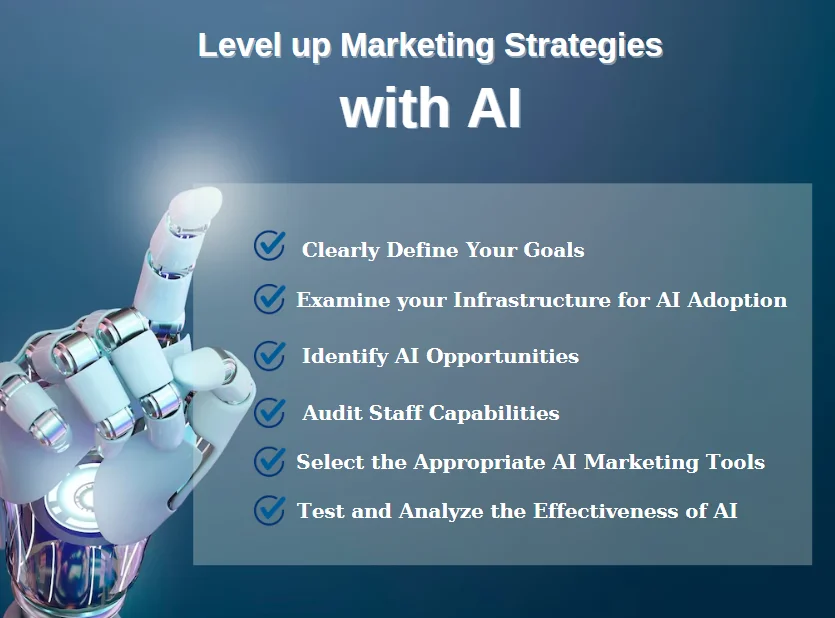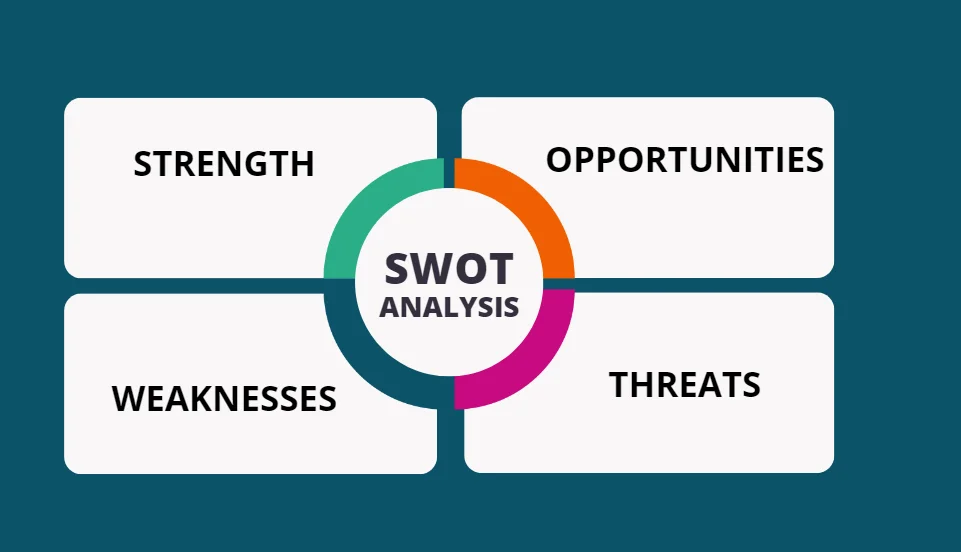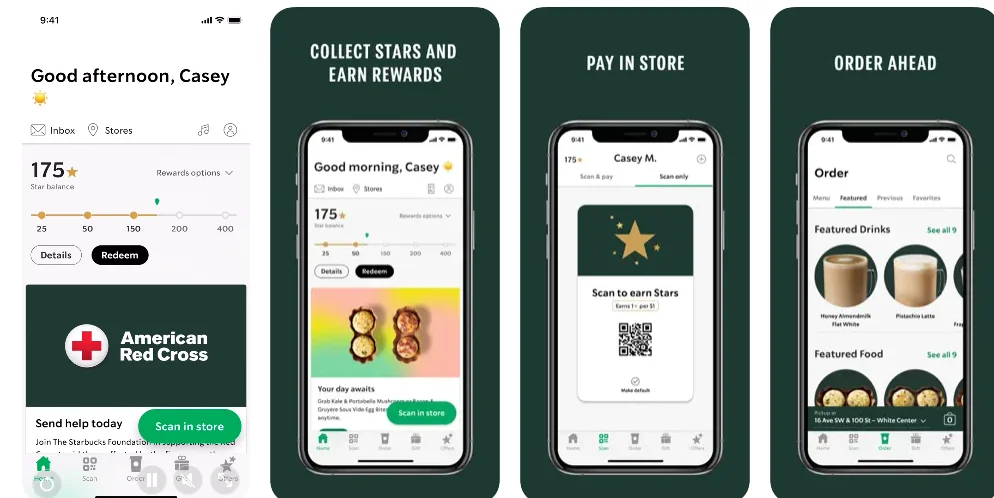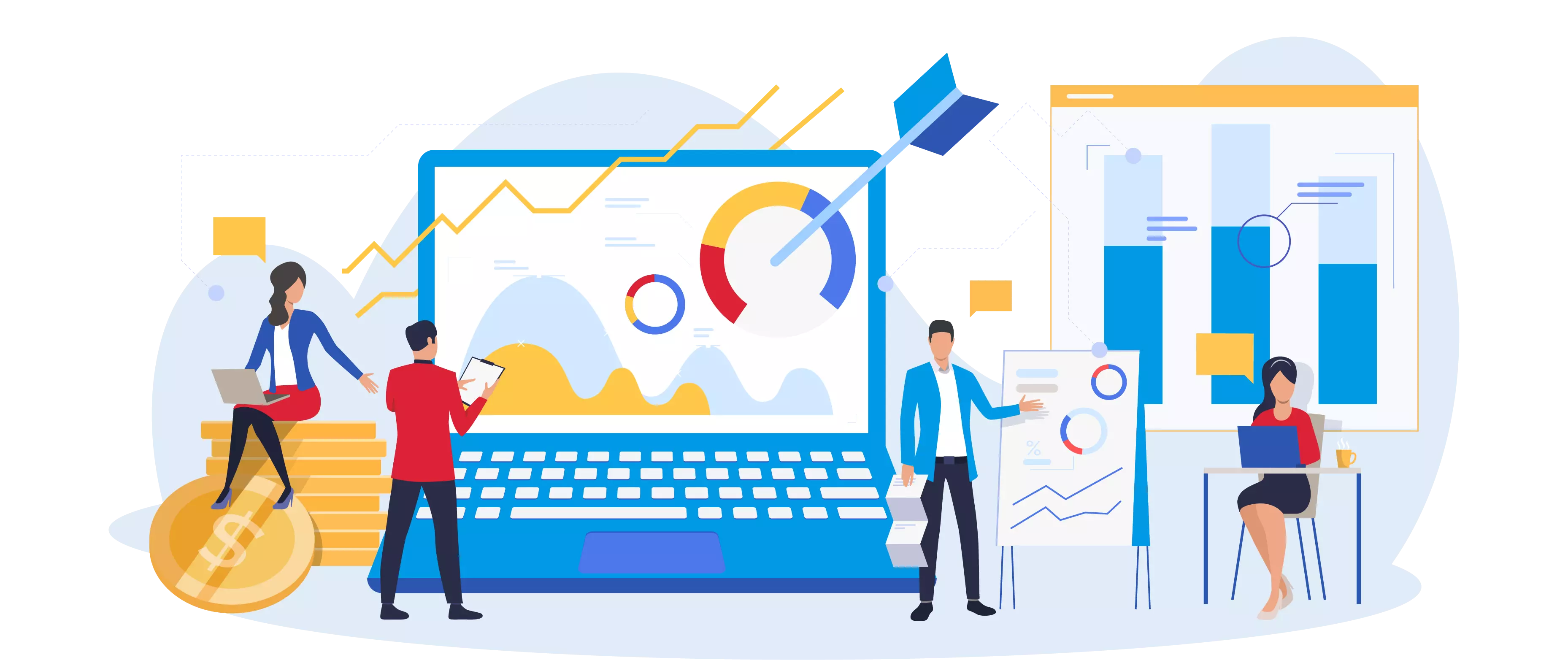AI Marketing: What, Why and How to use Artificial Intelligence in Marketing

Many companies use innovative technology to improve efficiency and enhance customer experience, often through AI marketing platforms. These tools help marketers better understand their target audiences, increase conversions, reduce workload, and more. Think of AI as a fast car providing all the customer insights you need. It helps you market efficiently and create personalized content that customers love. Don’t worry about the speed – we’re here to help you feel confident in the driver’s seat.
What is AI in Marketing?
AI Marketing is the intelligent application of artificial intelligence technologies to enhance and automate marketing processes. These include data analysis, customer segmentation, personalized communication, and campaign optimization. AI-driven tools can analyze large datasets to identify trends and insights that inform marketing strategies, enabling more effective targeting and improved ROI.

One of the key benefits of AI in marketing is personalization. AI algorithms can inspect customer behavior and preferences to deliver tailored content and product recommendations. This enhances customer engagement, drives conversions, and builds loyalty.
AI is also fundamental to automating routine marketing activities like email marketing, social media posting, and ad bidding. By automating these processes, marketers can focus on strategic planning and creative tasks, improving overall efficiency and productivity.
Furthermore, AI-powered predictive analytics can forecast future trends and customer behaviors, allowing marketers to adjust their strategies proactively. This leads to more accurate budgeting, better resource allocation, and, ultimately, more successful marketing campaigns.
While AI offers many benefits, it’s still a developing technology with some limitations. Let’s explore the advantages and disadvantages of AI in marketing!
| Pros | Cons |
|---|---|
| Efficiency: Automates repetitive tasks, saving time and resources. | Lack of Human Touch: May result in impersonal interactions. |
| Personalization: Delivers tailored experiences based on customer data. | Data Privacy Concerns: Handles sensitive customer information. |
| Data Analysis: Processes vast amounts of data to identify trends and insights. | Dependence on Data: Requires high-quality data for accurate results. |
| Predictive Analytics: Forecasts future customer behavior to optimize campaigns. | Ethical Considerations: Potential biases in AI algorithms. |
AI Marketing Use Case
AI is revolutionizing the marketing landscape, offering various tools and capabilities to increase customer engagement and drive business growth. Here are some key types of AI marketing solutions:
Use AI for Sales Forecasting
AI in sales and marketing helps businesses meet customer expectations and boost sales by analyzing customer data and predicting future purchases. It guides product promotion, manages inventory, and prevents overselling. Cirrus Insight is a prime example of software leveraging AI to enhance sales forecasting.
Generate Great Content with AI
AI tools can significantly enhance your content team’s efficiency by automating tasks like crafting emails, generating personalized messages, and curating social media content, enabling the team to concentrate on innovative and strategic tasks. To create high-quality content with AI, select the right tool, provide clear instructions, generate the content, and then review and edit it for accuracy and alignment with your goals.
Some popular AI Tools includes GPT-4 (like ChatGPT), Gemini, Jasper, Writesonic, and Copy.ai.
Important notes: Don’t Rely Entirely on AI for Your Content
Enhance PPC advertising
PPC (Pay-Per-Click) advertising is one of the most common online marketing strategies. Advertisers are charged a fee whenever their ad is clicked. GoodFirms’s research has shown intriguing findings regarding the application of Artificial Intelligence in PPC.
In particular, some top AI applications in PPC are:
- Smart bidding
- Micro-moment targeting
- Responsive ads
- Dynamic search ads
- Price optimization
Utilize AI Chatbots
AI is common in customer service, and used in live chats on websites and social media like Facebook Messenger, Slack, or WhatsApp. AI chatbots efficiently handle repetitive questions and create personalized content. When paired with customized marketing, they become proactive advertisers, not just customer service tools.
AI chatbots boost customer engagement and conversions with clear goals and targeted interactions. Define their purpose, use natural language processing for realistic chats, match their personality to your brand, and provide various interaction options like quick replies.
Important note: The best chatbot platforms will have pre-built integrations to popular channels and platforms.
Organize Email Content Automatically
Have you ever felt overwhelmed by the many emails in your inbox? AI could be the perfect solution to help you tackle this issue.
AI is transforming how we manage our inboxes. It can automatically:
- Categorize emails: Sort emails into specific folders based on content or sender.
- Prioritize: Determine the importance of emails and place them accordingly.
- Filter spam: Effectively block unwanted emails.
- Suggest replies: Offer potential responses based on email content.
- Schedule meetings: Propose meeting times based on availability.
Develop AI Speech Recognition Feature
AI speech recognition, used by chatbots like Siri, Google Assistant, and Alexa, converts spoken words into text to execute commands. This technology is also found in apps like Google Maps and Shazam. In marketing, AI speech recognition aids in voice search optimization, helps enhance customer service, analyzes feedback, and streamlines content creation.
Marketers should understand the basics of speech-to-text conversion and natural language processing and integrate these technologies with existing tools. Critical factors for success include data privacy, accuracy, cost, and user experience, which can improve customer interactions and marketing efficiency.
Ensure Data Quality and Privacy
AI improves data quality by automating cleaning, enrichment, and validation tasks. It protects privacy using differential privacy, breach detection, and data minimization.
For successful AI marketing, high-quality data is essential, requiring error removal, accuracy checks, consistency, and clear data ownership. Safeguarding customer privacy through data minimization, anonymization, encryption, and strict controls is equally vital.
How to Level Up Your Marketing Strategies with AI
AI is revolutionizing marketing, unlocking new possibilities to enhance customer engagement and drive business growth. Here’s how you can leverage AI to elevate your marketing strategies:

Clearly Define Your Goals
Before diving into AI marketing, pinpoint your objectives. Are you aiming to boost campaign effectiveness, streamline team operations, or reduce costs? Establishing clear, measurable goals is crucial for tracking success. Without clear targets, it’s difficult to assess whether your AI initiatives are achieving the desired outcomes.
Vague goals won’t yield actionable insights. Use the SMART framework to create objectives that are Specific, Measurable, Achievable, Relevant, and Time-bound. For example, instead of establishing an objective like “Increase website traffic and rank,” specify “Increase website traffic by 30% in the next month through AI-driven content optimization.
Large, overarching goals can be daunting. Break them down into smaller, achievable milestones. This method simplifies progress monitoring, celebrates successes, and makes adjustments as needed.
Examine your Infrastructure for AI Adoption
1. Assemble a Team
To begin, form a small team tasked with analyzing your current operational setup, including hardware, software, and processes. This team will identify potential areas where AI could enhance efficiency and productivity.
2. Create an AI Adoption Report
Your team should compile a report outlining all potential AI applications within your organization. For each identified area, assess the potential benefits, such as increased lead generation or faster customer service response times. Additionally, the necessary resources, including the budget for AI tools and employee training, must be determined. It’s crucial to consider both AI implementation’s potential advantages and disadvantages, including potential challenges or negative impacts.
3. Start Small and Scale Up
Avoid attempting a complete AI overhaul of your operations. Instead, select two or three areas where AI can deliver significant benefits. These initial projects can be relatively small-scale, such as using AI for meeting note summarization, interview transcription, or automating repetitive data entry tasks. By gradually integrating AI into your workflow, you can learn from the process and expand its use to larger applications as needed.
Identify AI Opportunities
To effectively leverage AI in your marketing strategy, it’s crucial to pinpoint areas where it can deliver the most significant impact.
Analyze Your Marketing Funnel: Examine each stage of the customer shopping journey, from awareness to purchase and beyond. Consider how AI can enhance lead generation, nurture prospects, and drive conversions. Look for opportunities to personalize the customer experience at every touchpoint.
Evaluate Your Marketing Tech Stack: Assess your existing marketing tools and identify potential gaps where AI can complement or replace current solutions. Consider the integration capabilities of your tools and the accessibility of your data for AI processing.
Align with Business Goals: Clearly define your overall business objectives. AI should be seen as a tool to achieve these goals, not a standalone initiative. Focus on areas where AI can directly contribute to revenue growth, customer satisfaction, or operational efficiency.
Conduct a SWOT Analysis: Evaluate your organization’s strengths, weaknesses, opportunities, and threats in relation to AI. This analysis can help you identify areas where AI can be leveraged to address challenges or capitalize on new opportunities.

Audit Staff Capabilities for AI Marketing Adoption
Assessing your team’s readiness for AI marketing is crucial. Here’s a structured approach:
- Identify Core Skills: Determine the essential skills required for AI marketing, such as data analysis, statistical modeling, programming, and digital marketing fundamentals.
- Evaluate Existing Skill Sets: Assess your team members’ current capabilities against the identified core skills. Identify skill gaps and strengths within the team.
- Conduct Skills Gap Analysis: Determine the specific training or development required to bridge skill gaps. Consider factors like learning styles, budget, and time constraints.
- Assess Adaptability: Evaluate your team’s willingness and ability to adapt to new technologies and processes. This includes assessing their openness to change and their problem-solving skills.
- Identify Potential Roles: Determine how AI will impact job roles and responsibilities. Identify potential new roles or skill sets needed within the team.
- Create a Development Plan: Develop a comprehensive plan for upskilling your team, including training programs, mentorship, and opportunities for experimentation.
Select the Appropriate AI Marketing Tools
Choosing the optimal AI marketing tool requires careful consideration. Prioritize tools that align with your specific business goals and blend effortlessly with your existing tech stack. Evaluate factors such as ease of use, data privacy, cost, and the tool’s ability to scale with your business growth. It’s essential to test multiple options and gather reviews from your team before making a conclusive decision.
Here are some recommendations for you to consider:
AI Tools for Digital Marketing
- Sprout Social: This versatile tool handles social media, customer care, digital marketing, and even competitive analysis, including sentiment analysis.
- HubSpot: Provides an extensive range of tools, including website building, email marketing, CRM, and AI-powered insights for data analysis and content creation.
Audience Research and Insights
- Answer Socrates: Uncovers popular search queries to understand audience interests.
- SparkToro: Gathers in-depth data on potential customers to inform targeting strategies.
- Google Trends: Identifies trending topics and content resonating with audiences.
Customer Journey Mapping
- Kissmetrics, Mixpanel, and Amplitude: These tools analyze customer behavior to identify pain points, optimize the customer journey, and uncover conversion drivers.
- Semrush Persona: Creates detailed buyer personas using AI-powered templates to understand target audiences better.
Idea Generation and Content Research
- AI Writing Assistants (Freepik, ChatGPT, Gemini): Generate content ideas, research topics, and create initial drafts.
- Content Research Tools (Reddit, Consensus, Milled, Clearscope, MarketMuse, Perplexity AI): Explore various platforms to gather information, analyze competitors, and optimize content.
Keyword Research
- AI-Powered Keyword Tools (ChatGPT, UberSuggest, Clearscope, KWFinder, Keyword Tool, Keyword Keg, SpyFu): Utilize AI to discover relevant keywords, analyze competition, and optimize search engine visibility.
Trend Analysis and Forecasting
- Social Listening Tools (Talkwalker, Brandwatch): Monitor online conversations to identify emerging trends and gain competitive insights.
- Data Analytics Platforms (TrendKite, Zoho Social): Analyze data to predict trends and visualize critical metrics.
By effectively utilizing these AI tools, marketers can gain a competitive edge, optimize campaigns, and deliver exceptional customer experiences.
Test and Analyze the Effectiveness of AI
It’s time to test your AI strategies. Start by choosing the top two or three areas for implementation and launching your programs. Set a specific timeframe and key performance indicators (KPIs) to track results.
For example, if you’re testing AI-written and AI-placed social media ads, run a one-month trial. Monitor and adjust the content as needed, and document your process. After the trial, compare the performance of AI-generated, human-generated, and AI-assisted content. Use these insights to develop a plan for the future.
Here is a detailed step-by-step guide:
Step 1: Defining Clear Objectives and Metrics
Before diving into testing, clearly outline your marketing goals and the specific metrics that will measure AI’s impact. These metrics should align with your overall business goals and be easily quantifiable. Key performance indicators (KPIs) might include:
- Return on Investment (ROI): Quantify the financial return generated by AI-powered marketing campaigns.
- Customer Acquisition Cost (CAC): Assess the efficiency of acquiring new customers through AI-driven efforts.
- Customer Lifetime Value (CLTV): Measure the long-term value of customers acquired or retained using AI.
- Conversion Rates: Monitor the proportion of website visitors or leads who complete desired actions.
- Engagement Metrics: Analyze metrics like click-through rates, open rates, and social media interactions.
- Customer Satisfaction: Assess customer satisfaction rates using surveys and feedback analysis.
Step 2: Conducting Controlled Experiments
To effectively assess the impact of AI, design controlled experiments and A/B tests that compare AI-driven campaigns with traditional or control groups. This approach helps identify significant differences in performance. For example, you can split your intended audience into small groups and use different AI strategies for each or compare AI-generated personalized content with generic content to see differences in engagement and conversion rates.
Additionally, evaluate the accuracy of AI-driven predictions about customer behavior and their influence on marketing outcomes. Finally, the efficiency and effectiveness of AI-automated tasks with those managed by humans will be compared to determine the best approach.
Step 3: Leveraging Data Analytics

Data is the foundation of AI-driven marketing, providing essential insights for strategic decision-making. By collecting and analyzing data from various sources, you can determine which AI-driven tactics contribute most to your marketing goals, map customer interactions to identify areas for AI-powered enhancements, and use predictive modeling to forecast trends and optimize strategies. Continuous optimization of AI models and algorithms, based on these insights, ensures ongoing improvement in performance.
AI Marketing: Outstanding Examples
BMW - Intelligent Personal Assistant
In addition to learning about the driver and optimizing the system and cabin experience for individual preferences, BMW’s AI-enhanced sports cars come with an intelligent personal assistant. This assistant manages various vehicle functions, including climate control, voice recognition, automatic lights, media, and more.
This remarkable assistant allows drivers to interact with their cars in the same way they use their smartphones. It is a voice-activated tool that can anticipate travel routes to simplify destination input, alert drivers, and integrate with other apps.
Starbucks - Rewards Program/Mobile App
Starbucks uses AI in its Rewards Program and mobile app to gather customer data. This approach has helped the company foster strong connections with its customers. For instance, Starbucks offers free coffee on customers’ birthdays. Additionally, through the mobile app, customers can use voice assistance to communicate with baristas and place their coffee orders.
Read more: Starbucks Marketing Strategy: The World’s Most Popular Coffee Shop

What Are the Drawbacks of AI in Marketing?
Please remember that AI is a tool, not a replacement
AI is a powerful tool, but it has its limitations. While it excels at data analysis and pattern recognition, it does not possess human intuition, creativity, or empathy. Therefore, combining human expertise with AI capabilities is essential for achieving the best results.
Let’s delve into the specific challenges AI presents in the marketing realm!
Data Privacy and Security Concerns
To effectively gain insights from your campaigns, AI must collect and analyze substantial quantities of lead and customer data, raising data privacy and security concerns. Transparency is crucial for gaining your audience’s trust, so it’s important to clearly explain how you collect, process, and protect their data.
Potentially Biased and Inaccurate Content
The quality of AI output depends on the data it is trained on. If the training data is unbalanced, the AI may produce biased or inaccurate predictions, leading to unfairly targeted ads. Ensuring diverse and representative training data is crucial.
Lack of Creativity
One disadvantage of using AI tools in marketing is the lack of creativity. While AI can generate content like headlines, social media posts, and articles, it often lacks the creativity and tone of human-written content. Marketers should edit and refine AI-generated content to add a human touch and make it more engaging.
What’s the Future of AI in Marketing?
As companies discover the benefits of AI, new tools and services will continue to emerge. While not every AI tool will benefit your business, many can be valuable. It’s important to evaluate which tools are most helpful and determine if they are worth the financial investment.
AI marketing campaigns can make managing some of your most tedious tasks much easier. They can also help you target your client base more effectively and build stronger connections with your audience. Consider our suggestions as a starting point to incorporate AI into your advertising practices, and you’ll likely see improvements in your marketing campaigns.
Conclusion
Artificial Intelligence has advanced significantly and is already shaping the future of marketing. It’s essential to implement this technology in your business. AI is undoubtedly the future. To run a successful online business in the coming years, using AI-powered marketing tools is crucial.
A Complete Marketing Solution for Holiday Seasons
Discover an all-in-one marketing pack





